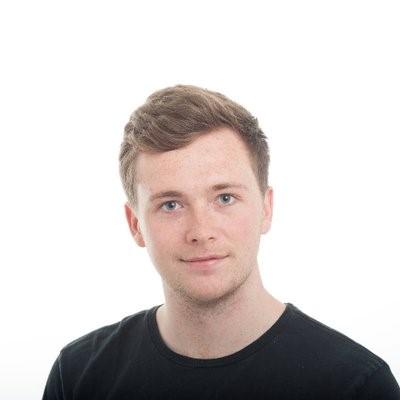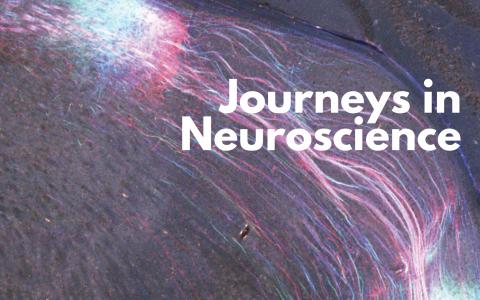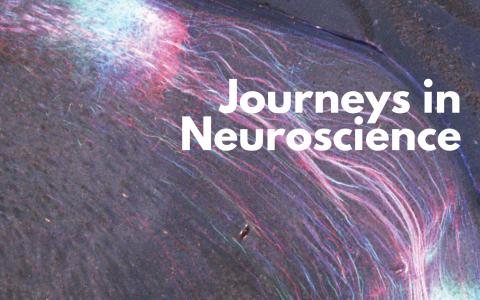
From a neuroscience PhD to building software for learning
An interview with Matthew Phillips, Co-founder and CEO at Learney, formerly a PhD student in the Branco Lab at SWC, conducted by April Cashin-Garbutt
Following your PhD did you decide to stay in academia?
Following my PhD, I decided to leave academia to co-found a start-up called Learney. We build learning software for companies that need help upskilling their employees in new technologies such as data science, machine learning and AI. Companies need individuals with competencies in these areas but it is difficult to hire people as these skills are very in-demand and so businesses are choosing to upskill current employees instead. At Learney we are building effective learning software that helps people do this quickly and efficiently.
How did your PhD help you to make this decision?
My PhD helped a lot with this decision because it helped me realised I enjoy working on long-term projects that I have control and ownership over. I really like the feeling that when you get a result in the lab, or build some new software or gain a new customer, it’s your work that has gone into that and my PhD helped me realise that was appealing to me.
Can you please give us an overview of how you founded Learney?
Directly after my PhD, I started working on Learney and we legally founded the company about 9 months ago. The motivation was to solve a personal problem that I’d had: throughout my time at university and during my PhD, I knew I wanted to learn about data science and machine learning but it took me a lot longer than I think it should have. The reason for that wasn’t a lack of resources, all the materials are online if you want to learn, the problem is getting motivated and sticking with it.
Lots of people have motivation that they want to learn, but actually setting a routine and doing it seems to be hard. The reason for that? We think it’s because the lecture model is not the best way to learn. If you were designing a way of learning from scratch, you wouldn’t sit in a lecture hall and have someone talk at you for an hour. Most of the scientific literature suggests that having teaching be much more interactive and spaced out in time in the right way makes a huge difference to your ability to learn.
We initially built Learney directly for consumers, but we realised that people are very busy and have other priorities. And so we decided the best way to get started was to target companies and embed this within the workplace. A lot of companies are making a huge effort towards this at the moment.
We are still in the early stages, we have customers and investors but we have a long way to go! There is this notion in start-up culture of product-market fit, which is when you build a product and market it in the right way then people start flooding towards you as you’ve solved a problem for them. We’re not quite there yet but we are making traction.
Who is the co-founder of Learney and how did you meet?
My Co-founder Henry did a masters in Information Engineering at Cambridge and then he started working as a software engineer and a machine learning researcher. We met on a programme called Entrepreneur First.
One of the hardest things about starting a company is having a co-founder that you work well with and who has a complementary skillset. Not that many people want to start companies at any given time and Entrepreneur First try to solve this by bringing together a range of people from different backgrounds and getting them to pair up and iterate through different ideas until they find something that will work.
The programme was really good and Entrepreneur First have the chance to invest in companies at the end. Henry and I met on the programme and then went onto raise money afterwards.
What were the key skills you gained during your PhD that have been most helpful for the work you are doing now?
Definitely persistence! For a long time during your PhD things often don’t work well and you need to keep making iterations both from a technical perspective but also strategically in terms of working out a clear set of experiments to do next. The process is remarkably similar in a start-up! You’re constantly trying out small experiments, but with the market being the thing you’re testing instead.
Most of the things you do will fail and therefore the same persistence that you need during a PhD in science is exactly the same as when you’re starting your own company. You also need to be able to manage your own emotions, as it can be quite disheartening when you try things and they’re not working for a long time.
Before you started your PhD, did you always want to build your own company? If not, what inspired you to move in this direction?
I was always intrigued by starting my own business as there are some companies that I really admire that have done amazing things. Personally, I really care about having impact in the world and making a difference to the things that I care about.
If I’d have tried to start my own company after I finished my undergraduate degree, I don’t think it would have been the right time as I didn’t really know what it would involve. I’ve always been interested in science and technology but I didn’t realise start-ups are actually like science in lots of ways. I made the connection that when you’re trying to build something, be it a body of research or a company, it is like searching through the unknown. The skills that you gain from academia and the ways of thinking can be similar. Once I started to think about building a start-up in this way it made it more appealing and I realised I could take on the challenge!
After I started getting interested in building my own business, I listened to how founders of companies talked about how they got started. It made me realise that the feeling of not knowing how to start doing something, is how everybody feels at the beginning. If people knew exactly what they needed to do to build a company, they’d go and do it! It is just very difficult knowing what the market wants.
I made the connection that none of the founders when they started knew that it was definitely going to work and they had lots of challenges along the way. But I knew that I can learn things and that empowered me to get started.
Entrepreneur First acted as a good bridge for me. Also I was conscious that it is very difficult starting your own business when you have lots of big responsibilities in your life as there is risk involved in taking the plunge. I knew that I would regret not starting my own company at this stage of my life.
What are your future career plans? Looking back, what would you say was the most important thing you learnt during your PhD for your future career?
For the foreseeable future, I plan to build this company. We want to have an impact on the world by trying to solve this problem of how to train people on complex subject matters.
So many people will need to change their careers in the future due to automation. Our aim is to enable people to make career transitions by giving them the skills they need to do new types of job that are going to become available in the future. It is a really tough problem but I think it is very important that we solve it as a society.I think it you are lucky enough to be in a moderately comfortable position in an affluent country, there are so many opportunities out there if you are willing to take a risk. For the rest of my career, I hope to try to push my boundaries and discover different things that I haven’t tried yet.

About Matthew Phillips
Matthew did his undergraduate in neuroscience at UCL, before doing his PhD at SWC in Tiago Branco's lab. He also did research at Janelia Research Campus and DeepMind. After his PhD, Matthew founded a startup called Learney.

